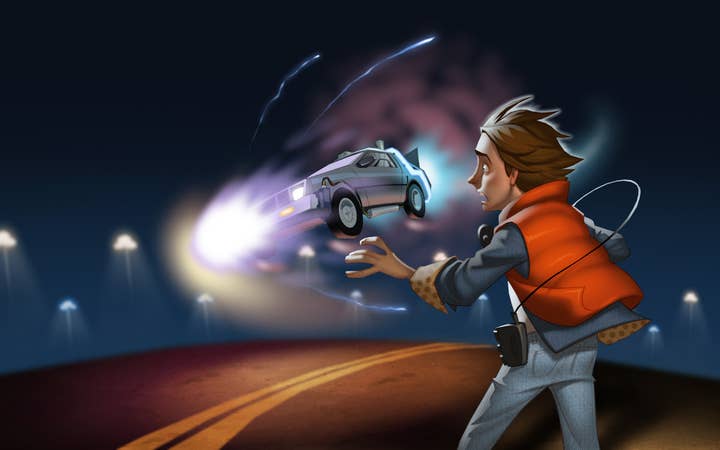What we can learn from... The Future
2019 in Review: Department of Play's Will Luton on the trends technologies and that will disrupt the games business over the next decade
What we can learn from… is a regular series from the founder of management consultancy Department of Play, Will Luton. It examines what the games industry can learn from a single game, trend or topic.
As the '10s draw to a close and every outlet posts definitive retrospective lists, it's a great time to do something as self-indulgent, inaccurate and rabble-rousing: attempt to predict the future. Specifically, let's take a punt at the leap '20s will bring us.
This time ten years ago we'd just gotten the third generation of iPhone and we were starting to see the first free-to-play titles hit the App Store. League of Legends had just launched, Angry Birds was about to, the Wii was at its peak, indie games were a novelty, and nobody had heard of Tencent.
Meanwhile a 17 year old boy was tinkering with goggles in his parent's garage. Palmer Luckey would hurtle from zero to hero to alt-right villan before the end of the decade, as would fellow billionaire Markus 'Notch' Persson. China and mobile games exploded, eclipsing the revenues of the traditional console and PC markets. And free-to-play overshadowed everything, for good or bad.
"Next gen AI will let us all concentrate less on how to make a game and increasingly more on the what and why"
Ten years is a long time in games and the only certainty is change. What could possibly happen in the next decade?
AI makes making easier
Last month, in a rather drab announcement, Microsoft dropped a new set of tools: AI-assisted refactoring and line prediction. Visual Studio's IntelliCode tool is adding a productivity-boosting AI trained on over 14,000 public repositories. Meanwhile an academic paper showcased almost perfect text-to-speech impressions trained from as little as three seconds of audio samples.
These technologies foreshadow an incremental shift in what will be a bigger trend in game development over the next decade: AI tools and assistance.
In the last decade middleware has let game makers reach higher levels in the development process. In the next decade AI will go even further. Next gen AI will let us all concentrate less on how to make a game and increasingly more on the what and why. This AI assistance will extend beyond coding in to other manual tasks, such as animation, data analysis and level design.
Additionally, AI will offer us fully interactive dialogue and narrative for the first time as techniques and computation power improve. AI game-masters will let us build experiences that look like MMOs but play like pen and paper RPGs. Voice will be as commonplace a control method as joypads or mice.
The knock-on impact of this will be huge. Games can simultaneously be grander in scope and require fewer people to make them. This means more ambitious indie titles and cheaper overheads for AAA productions.
"XR games will blend with our surroundings, be always-on and make use of locations in our everyday life"
A breakthrough XR product
Virtual reality has been notable in the last decade for the hype, excitement and ultimate lack of consumer interest. Those most aggressively aggrandising the promise of VR are fixated on the current technical challenges of the hardware. But the technology is already good enough -- at least for the intrusive, vision blocking VR.
A breakthrough device will arrive in the next decade which, much like the iPhone, succeeds not because of technically better hardware but because of fundamental understanding of how people will use that hardware. Some kind of XR (eXtended Reality) -- which overlays on to our own world, that is convenient and non-intrusive -- will be the biggest shift we'll see in hardware.
XR games will blend with our surroundings, be always-on and make use of locations in our everyday life. We'll be able to play more traditional experiences on cinema-size screens while sat on the toilet, or drift to sleep lazily flying through the clouds of warm, tranquil planet.

No more nine-to-five
Travelling five days a week to an office for the nine-to-five is a hangover from the time of fax machines, suspended ceilings and motivational posters. These hours are too intensive and the need for physical collocation has disappeared thanks to better communication technologies.
The coming decade will see many of us flee ever more expensive and crowded cities, to work fewer hours, getting more done, somewhere more affordable and spacious. 5G will mean ever-present fast connectivity, while Slack, Google Docs and similar tools make text and video call collaboration the default. Studios that tie employees to a physical location will lose out on the global talent pool and suffer greater overheads, while enforcing a five day work week will see reduced productivity, worse mental health and greater job dissatisfaction.
Evidence points towards the benefits of fewer hours, such as four day weeks, and the success that distributed teams can have. Facepunch, for example, is a studio of 34 people across 12 countries all working remotely. Many might think this remote, time-zone shifted team would struggle to organise work and discuss ideas, yet it currently has two games in Steam's top 25 concurrents.
The '20s will be a huge reimagining of how we work. Remote will become the default for new startups, existing teams will hire more freelancers, and shorter hours will result in happier staff and better projects.
"Travelling five days a week to an office for the nine-to-five is a hangover from the time of fax machines, suspended ceilings and motivational posters"
Cultural divides evaporate
If you look at any given top grossing games list, you'll see a bunch of products you know and love and a bunch you've probably never played. For every Clash of Clans or Call of Duty, there's a Crossfire or Honor of Kings.
Despite the incredible growth of games across China, success is still regionally insular -- the argument being that gamers have specific tastes influenced by their unique cultural heritage. Yet, it is often the case that these regionally popular games are in genres popular the world over: shooters, MMOs and MOBAs, for example.
The reality is less about cultural difference -- good games are good games -- as it is the fact that the Chinese and Western markets have been largely inaccessible to one another. This is both very literal in the case of China's long ban on home consoles and restrictions on game releases, and more subtly in the peculiarities of each nation's marketing channels.
China's giant companies are investing heavily in western studios, creating an unprecedented portfolio of games. Ostensibly this allows them to bring Western content back home, but also to bring content from China's best studios to us. Western publishers such as Blizzard and Riot continue to push their games to have cross-border impact, with multicultural characters and regional esports presence. In mobile we see design paradigms shifts with gacha coming from Japan and once derided virtual d-pads from China gracing many of our top grossing mobile games.
As the internet makes our world smaller and China becomes more and more integrated into the global economy, we can expect great games to travel farther. While China is the leading indicator of this global trend, as the decade progresses we should also be looking towards Korea, India and Africa as both our next players and next colleagues.

Platform boundaries and business models blur
If there were two standout trends of the '10s, it was free-to-play and mobile: a new platform and a new business model that seemingly came from nowhere and produced a completely new audience. Early in the '10s, traditional PC and console game makers eyed both with incredible trepidation. First they ignored the trends, then became somewhat sneery, and finally increasingly interested.
As the decade turns, half of Department of Play's clients are from PC and console backgrounds. These businesses are often looking to understand how to bring their products to mobile, employ data-led product management techniques pioneered on the platform, or leverage in-app purchases like free-to-play games. But these studios are not looking to emulate mobile and free-to-play but rather augment their existing products.
"As the decade progresses we should be looking towards Korea, India and Africa as both our next players and next colleagues"
Following Fortnite and PUBG, it's increasingly obvious that platform boundaries are an unnecessary hindrance, while the Battle Pass has reinvented the subscription model. Likewise, FIFA's Ultimate Team became a $800 million per year free-to-play game by virtue of being bundled with a popular paid game. Meanwhile Xbox, PS4, Apple and Google are offering some form of Netflix-like subscription service.
The lines between platforms, as well as paid, free-to-play and subscription models, will continue to blur. By the end of the next decade platforms will become a minor preference with players swapping between mobile, handheld, PC and console depending on circumstances, while paying (or not) incrementally.
Games become culturally preeminent
At the end of the last decade the Wii was on track to occupy 100 million living rooms, giving grandma her first taste of gaming. But it was mobile that really expanded our player base. Today we're approaching three billion people with a game-capable device in their pocket at all times.
Three. Billion. Players.
And titles like Pokémon Go and Subway surfers have already broken the 1 billion download count. Gaming is no longer the niche for a small sliver of the population, but the most far reaching entertainment that humans have created. In the coming decades world leaders, critics, writers, actors, singers, painters and architects will all be game natives. Games will be as socially and artistically influential as movies, music or books, if not more so.
The exact impact of this will be subtle and far reaching. Players will drift from mobile to PC and console. Genres will expand, new niches become viable and hits will get bigger. Games will be the way families connect, and their premieres will be anticipated, water-cooler moments.
But most importantly, games will no longer feel like outsider art. Instead, we will be the default cultural medium.
Will is a veteran product manager and game designer who now runs management consultancy Department of Play, helping companies such as SEGA, Rovio and Jagex to grow their mobile, PC and console games. Will is also an avid retro games and pinball player.
